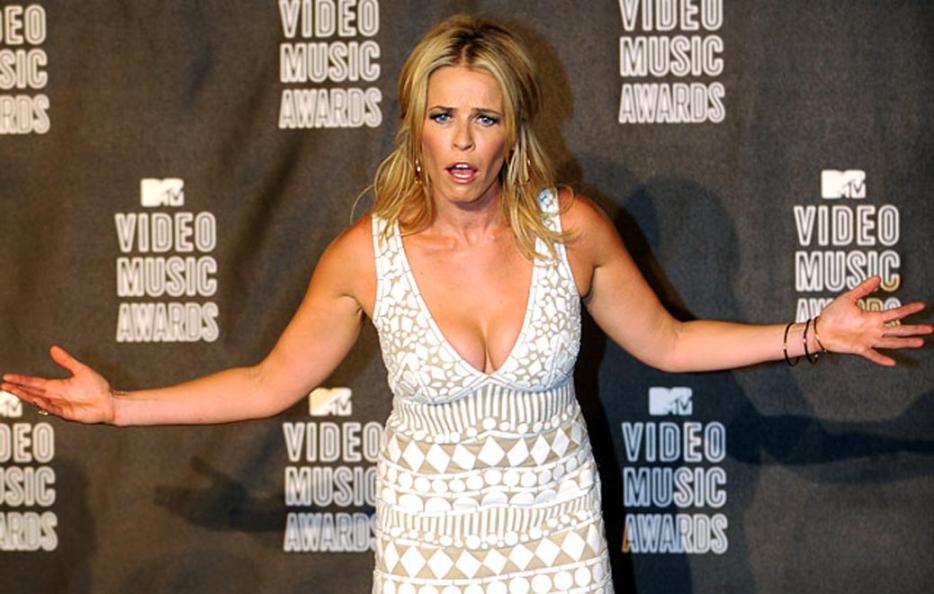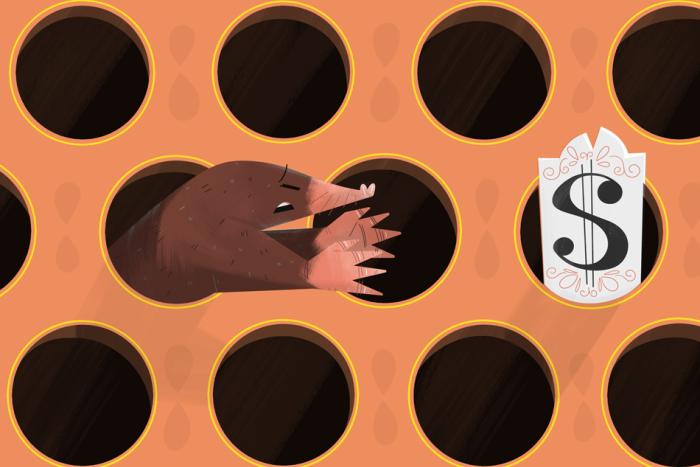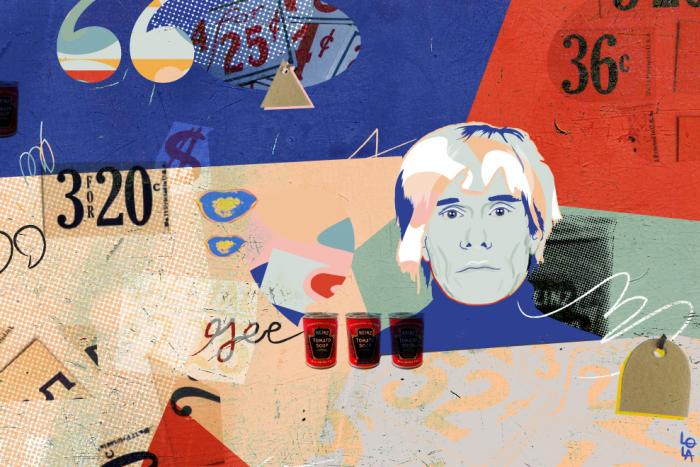Recently, my mother, a savvy lady with a comedy and acting background, asked me a serious question. We were on a marathon telephone call at the time. “Who is this Chelsea Handler person?”
Deep breath, now. “Chelsea Handler is a comedian,” I told her. “She wrote some books, she had a late night talk show, and she has a sitcom.” And now, I might have added, she’s a household name. While my mother knows culture—she taught me to love oddball lady comics like Gilda Radner and Catherine O’Hara, and, as a high school drama teacher, she’s spent three decades with teenagers—she is still a 58-year-old woman from a small town. I am now the expert (she also asked me what dubstep was, and I declined to explain).
“Huh. Well, I decided I don’t like her,” concluded my mother, who had discovered Handler earlier that day via entertainment news segment. “She seems like she’s mean. One of those nasty popular girls.” I agreed.
But after we hung up, something nagged at me. No matter how obnoxious we may find Handler and her acolytes, back in 2005—the year she published her first book, the sex-life-on-display memoir My Horizontal Life (followed by Are You There, Vodka? It’s Me, Chelsea in 2008 and Chelsea Chelsea Bang Bang in 2010)—there were no network sitcoms with female leads. The only female-helmed talk shows were of the daytime variety (The View, anyone?). Movies? Forget it—The 40-Year-Old Virgin and Wedding Crashers, both as male-oriented as the day is long, were the banner comedies that year (though a small shout-out to Sarah Silverman’s Jesus Is Magic is probably in order). The only truly notable female comedian at the time was Tina Fey, who, after becoming the first female head writer of SNL in 1999, had transitioned to the Weekend Update desk.
Since the arrival of Handler’s book in 2005, however, there has been a veritable avalanche of Femoirs—memoirs by contemporary female comedians—culminating in the smash success of Fey’s Bossypants last year. These books have propelledtheir authors from acts to brands. Could it be that the “mean girl” I was so wary of actually served as the catalyst for the current female comedy movement? I shuddered to think.
The comedic memoir is virtually a career requirement for any funny person, helping to establish a comedian’s voice and character for a larger audience. In essence, it’s a longform version of a standup set (its contemporary iteration can probably be traced back to Woody Allen, whose effete comedic monologues were easily translated to profitable books that helped mainstream his sensibilities, and to Nora Ephron, RIP, who performed a similar feat, albeit more journalistically). Memoirs are particularly essential for female comedians, for whom awkward, soul-bearing confessions have become a currency. And because the success of Bridesmaids, HBO’s Girls, et al. has made the female comedic voice not only tenable but also desirable, the Femoir, while not unique from its male counterpart, is, in marketing parlance, So Hot Right Now. You can be a male comedian and not write a memoir. But if you are a female comedian, you would be stupid not to.
But while the Femoir is excellent marketing for female comedians, and a chance for them to build careers on a par with male comedians (leading to your Home Improvements, your Everybody Loves Raymonds, your Louies, et al), it is also a highly formulaic, and incredibly limiting genre. Because there are really only two roles for a woman in comedy: you can be a Chelsea, or you can be a Tina. How did we get here? Are we stuck in a two-party comedy system? Are you there, Femoir? It’s me, Kaitlin.
2005: The Chelsea Archetype
While most of us know about Chelsea Handler—the foul-mouthed blonde bombshell comedy powerhouse, late night talk show host, sitcom doyenne, dater of 50 Cent, etc.—not as many realize that the Big Kahuna of dirty, sexy comedy can trace her success back to a book. Back in the early 2000s, Handler was just another stand-up “comedienne” (a diminutive since abandoned, thankfully) hoofing from club to club and playing a man’s game. By 2004, she had a few development deals in the works, but network executives, according to an article from the actors’ rag BackStage West, were trying to remake her in their own idea of a female image (sweeter, kinder, more pliable than Ms. Handler actually was, says the piece). So Handler got herself a book deal with Bloomsbury [full disclosure: my current employers], for a memoir written by her in her own voice. My Horizontal Life: A Collection of One-Night Stands is a rangy collection of Handler’s perversions, recounted from the tender age of six, when, on a sibling-initiated dare, Handler photographs her parents having sex. The book goes on to detail her sexual adventures with midgets, much younger men, and more besides.
Bloomsbury, pockets lined with Harry Potter money and in brand-expansion mode, had taken a gamble: truth about lady business was heady stuff in those days. (Honestly. It seems almost antiquated now, doesn’t it?) But it paid off: MHL shot straight up the New York Times Bestseller List. While the market for female humour was, at the time, scarce, Handler had tapped into the internet-detonated mushroom cloud that is TMI-overshare culture—reality TV, YouTube, and celebrity gossip on one hand; revealing, mass-market autobiographical books on the other, including Dave Eggers’ A Heartbreaking Work of Staggering Genius, James Frey’s A Million Little Pieces (later revelations notwithstanding) and Augusten Burroughs’ Running with Scissors. The stars had aligned: a premium had been placed on the kind of information Handler was willing to share, in the format she wished to share it in. That she was putting dirty laundry on the line while looking cute and wearing heels only sweetened the pot.
Which is not to say the book isn’t worthwhile. It’s genuinely funny, and surprising, if a little scattered (Jeannette Walls she ain’t). And as self-deprecating, dirty, and full of hot shame as it is, it’s empowering in a sideways way. As the BackStage West interview implied, Handler had been a difficult sell in boardrooms and backrooms—her beauty and crude power made her intimidating in a male-dominated culture as yet unused to seeing women assert themselves. But by undercutting her power with tales of sex gone awry, she was able to maintain accessibility while still being fem-balls-to-the-wall.
I remember reading MHL and thinking, “Ew,” but also, “Good!” because although it was not good literature by any stretch—nor was its author someone I felt an affinity for—its existence felt important in a way I couldn’t then articulate, a way that now seems abundantly clear. MHL brought to the fore an enduring lady comedy archetype, a coinage that execs could spew in meetings: The Female Fuckup, who would go on to blossom in Bridesmaids (never has a female character failed so hilariously, miserably, and wholly onscreen as Kristen Wiig’s Annie). Then there’s Girls, in which Lena Dunham’s naked body alone is an affront to the notion of female achievement. It’s flabby and neglected—fuck-uppery literally embodied (and then it gets worse: she opens her mouth).
MHL saw the beginning of a Handler avalanche, which would over the next seven years net its star 22 million dollars, a late night talk show on E! called Chelsea Lately, and a primetime sitcom. It would spawn an army of Handler offshoots, including former Chelsea Lately writer Whitney Cummings, whose god-awful TV show Whitney somehow survived the axe this season. And—gulp!—it opened a mainstream portal to female comedy.
[pagebreak]2006–2010: A Million Little Chelseas
Between 2006 and 2010, the following notable Femoirs graced the shelves of bookstores everywhere: I Like You: Hospitality Under the Influence by Amy Sedaris (Martha-Stewart-on-crack by comedian, actress, and sister to ur-comedy memoirist David Sedaris); Are You There, Vodka? It’s Me Chelsea and Chelsea Chelsea Bang Bang (both bestsellers); The Bedwetter by Sarah Silverman (darker, smarter, and more sincere than most Femoirs, with much less sex; consequently not as popular); Official Book Club Selection by Kathy Griffin (the D-listiest of the bunch); I Was Told There’d Be Cake and How’d You Get This Number by Sloane Crosley (the “writeriest” of the bunch); I Don’t Care About Your Band by Julie Klausner (if Handler dated hipsters); I Know I Am, But What Are You? by Samantha Bee (a more traditional memoir, in the here-is-my-life sense); I Feel Bad About My Neck and I Remember Nothing by Nora Ephron (longtime female humor writer resurfaces to remind us she was here first and, arguably, best; fills middle-aged lady void. Again, RIP to a magnificent comedic voice).
These Female Fuckups are successful at failing: at dating, marriage, being mothers, being friends, growing up, functioning in society, being famous, and at life in general. Conventionally speaking, the Femoir genre most often comprises a series of essays (as opposed to a coherent, novel-like structure); this is both easier to write and easier to read. The essays are usually laid out chronologically, beginning with an “origin story”—like Handler photographing her parents mid-coitus—that will neatly, helpfully and almost completely explain just how this woman began on her path to fuck-uppery. These books being psychoanalytic by their very nature, there will be at least one essay about a father or father figure, one about a terrible relationship that went on far too long, and one about a lover that was too ideal and was therefore set aside in order to continue to succeed at failing. Notably, the jacket copy of nearly every title above makes reference to Handler’s books; Handler even blurbs a few.
The Femoir, without deviation, explains this creature we see before us: Lady Comedian. No need to get into the “women aren’t funny” debate directly, but it is critical for our purposes to mention that it is still happening. As recently as this June, when the National Post rehashed the issue, we were still discussing the female comedian as a rare, incomprehensible creature (if she existed at all)—a Bird of Paradise. I’m not just being poetic. Victorian naturalists gave this name to exotic birds because, in pre-photography days, you had to go deep into sweaty equatorial jungles to kill, stuff, and bring back the animals you wanted to study. The birds’ legs were cut off so they’d take up less room in transport, which led the Brits back home to believe that they had no feet. It was thought that they were always flying, imports direct from the Garden of Eden. Similarly, the Femoir perpetuates this notion that women comedians are a genus unto themselves. Handler-type books hold some anthropological interest for those who need to be eased into the idea that ladies are sexual creatures—funny, weird, and gross, to boot. Those who still don’t really believe we have feet.
Most of the people giving these ladies money to write are not comedians and not ladies; being moneymen, they steer the ship towards the proven thing. Lest we forget, the world is still run by behind-the-times dudes (recall the recent furor over use of the word vagina—vagina! vagina!—in US politics). Femoir authors are not themselves blameless, of course: who wouldn’t want to write something that will make you as rich and famous as Chelsea? So why not write something Chelsea-ish, especially if your act/shtick/style is already in that wheelhouse? Rinse. Repeat.
When it comes to the Femoir, it’s not just that sex sells, it’s that only sex sells. That is, at least, until Tina.
2010–Present: The Backlash
As Handler’s star rose, so did that of the shadow-Handler: Tina Fey, the lady comedian’s comedian, who, while less bankable, boasts more did-it-herself credibility. In comic book lingo, one might view Handler as the Bruce Wayne/Batman to Fey’s Clark Kent/Superman: Batman’s impressiveness is due in part to a big bank account and some dedication to vengeance (read: bitchiness), while Superman’s motives seem, by comparison, more pure but also more naïve. Batman is flashier, sexier; Superman is easier to love. This might also explain how they seem to live in different worlds (Gotham/Metropolis) but really don’t (New York City/this world).
With the Chelsea archetype firmly entrenched and saturated to the point of flood, Tina Fey’s Bossypants, released in 2010, arrived at precisely the right time. It is the anti-My Horizontal Life; 22-year-old virgin Fey’s life was painfully vertical. Her bowl cut was not at all tousled; her daddy issues are mainly that he was too awesome and she therefore loves male authority figures like Lorne Michaels. Instead of dumping her too-nice lover, she married him (they have two daughters; he does the music for 30 Rock). It’s not the tales she’s telling, which are wholesome compared to Handler’s, as much as how she tells them. Handler was stage before page, but Fey is a writer above anything else. Bossypants, released last April, hit the number one spot on the New York Times Bestseller List and stayed there for five weeks. By September it had surpassed one million units sold.
Fey is, however, definitely a Femoir writer, and she owes more to Handler than you’d think. It’s because of people like Chelsea (and Joan Rivers, et al.), shouting loudly and carrying a big microphone that culture acclimatized to the female voice. Women in comedy finally got to be women in comedy—albeit a certain kind of woman—rather than men-lite. So Fey can be herself without (a lot of) explanation, and she doesn’t have to put on masculine airs. Fey’s brand is a backlash, but a polite one, perpetrated by good girls, nerds whose obsessive outlook has become mainstream. If the Chelseas broke through the glass ceiling, this new crop is trailing them with a Swiffer, in a dowdy skirt, gathering up the broken glass and apologizing profusely for all the trouble. Ballsy and loudmouth has been done. Bookish and awkward? Come on down!
Fey is not a fuck up, but a Female Flubber. Her failures have lower stakes, and her reparations for said failures are swifter and more sincere. Bossypants begat its own line of like-minded books, including Is Everyone Hanging Out Without Me? by Mindy Kaling, who had a bowl cut once, too, and also listens to her daddy. (“I can’t be Tina. Tina’s awesome,” she warns in her introduction.) Then there’s Rachel Dratch’s newly-released Femoir, Girl Walks Into a Bar, about her disastrous dating life and unexpected midlife baby. (Dratch, it should be noted, was the original Jenna in the 30 Rock pilot, having inspired the character. But the network reportedly thought she was too similar to Fey and not sexy enough; thus the fame-hungry airhead played by Jane Krakowski was substituted.)
This fall, Kaling’s got a show on Fox about a flubber lady doctor. Dratch recently appeared in Adam Sandler’s That’s My Boy as the character “Phil’s Wife” opposite fellow SNL-alum Will Forte. She was also examined twice, recently, in the press,in articles entitled “Hollywood Thinks Rachel Dratch Is a Troll (But if She Were a Dude, She’d Have Her Own Show),” (Jezebel, April 5) and “Is Rachel Dratch Too Ugly for Hollywood?” (Slate, April 12). The latter, importantly, debates whether or not she is funny.
The Bossypants-type Femoir is nicer, quirkier, and for the average lady comedian—myself included—much more relatable than its counterpart. But these titles comprise only half of the rigidly two-tiered Femoir market. Less than half, actually. Chelsea Handler recently acquired her own book imprint to source titles similar to hers. And the most recent Femoir to land on shelves, after Dratch’s, is by Handler staffer Sarah Colonna. The title says much: Life as I Blow It. The cover? Pretty lady with large breasts, blowing a gum bubble, her dress falling gently between her widespread legs; she would never be called a troll. Handler, of course, blurbed it.
The Future of Femoir
And so the Femoir machine grinds on, churning out Chelseas and Tinas, and after nearly seven years on this path, we’ve only got the two. Between them lies a gaping chasm of female comedic possibility, and this duality—bad girl vs. good girl—points to larger, more pervasive problems to do with how women are viewed in culture. The eternal court case of Madonna v. Whore, Betty v. Veronica goes on. Don’t get me wrong, I’m grateful to Handler—dubiously so, but grateful. She kick-started something important for female comedians everywhere. I’d just like to see a day when we do not have to debase or limit ourselves, in ways large and small, to grab a book deal.
The more literature by female comedians—no matter its lack of literariness—the better chance we have of normalizing women in comedy. Without My Horizontal Life, there would be no Bridesmaids, no Girls. Without Tina Fey, there’d be no Lena Dunham—who might actually occupy a sticky-sweet spot between Fey and Handler. The evolution process is frustrating and moves by degrees, but at least it moves. Getting more women into behind-the-scenes roles—as Fey says in Bossypants—will help. After all, eventually someone invented photography, and Victorians figured out those birds had feet after all.






